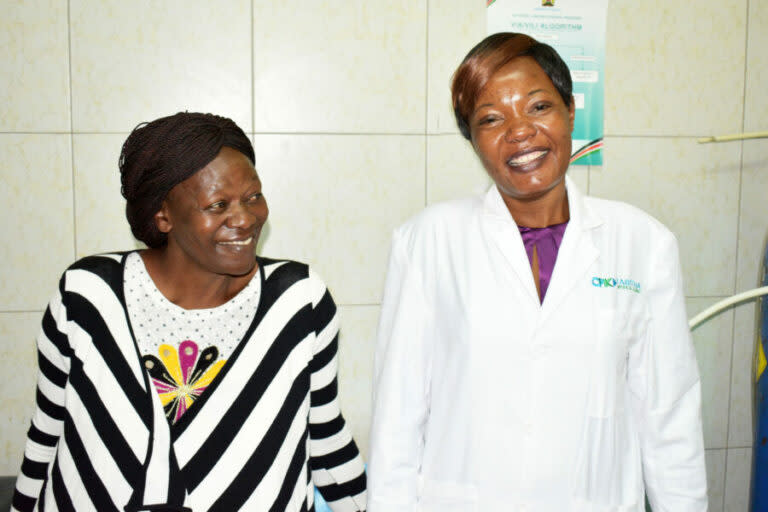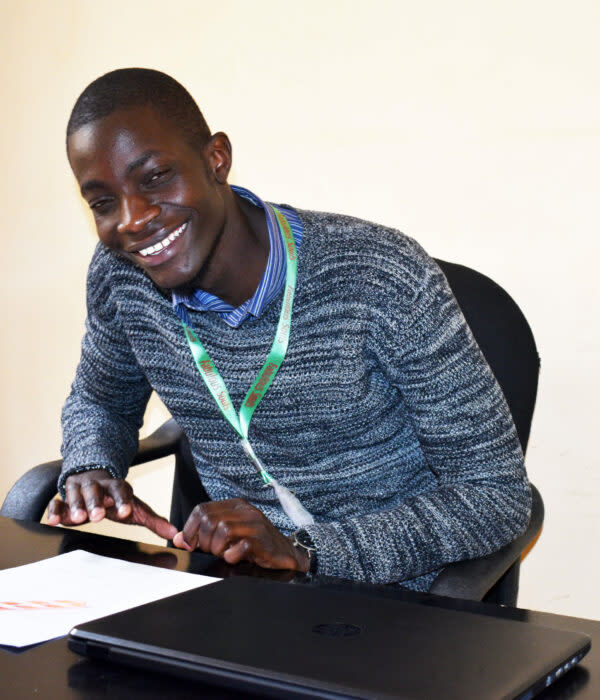Our Mission
CFK Africa collaborates with residents of informal settlements to address inequities around access to quality health care, develop local leaders, reduce gender disparities, and catalyze positive change. Headquartered in Kibera, CFK Africa combines service with responsible research to inform and assist participatory development and inform policy.
Donate Now
Our Impact
almost 2 years ago — Kibera, Kenya

When 53-year-old CHV Rose Akoth was mobilizing women in the community of Kibera to go for cervical cancer screening in 2018, she never thought that the disease she had been battling for four years was cervical cancer. Through its clinics (Tabitha Medical Clinic & Tabitha Maternity Home), CFK Africa conducts routine cervical cancer screening and treatment daily for all women of reproductive age within Kibera. The main goal of this program is to isolate seemingly asymptomatic individuals who have abnormalities that indicate that they could be having a pre-cancerous condition and link them promptly with the appropriate diagnosis, care and treatment. Tabitha Medical Clinic offers early treatment for patients with pre-cancerous lesions who qualify through cryotherapy, which is provided for patients with low-grade lesions, and LEEP treatment, which is provided by a gynecologist to all patients with high-grade lesions. Almost 90% of women who qualify for the treatment have benefited from the management of pre-cancer treatment at the facility level. In collaboration with the sub-county Ministry of Health, CFK Africa also conducts HPV vaccination campaigns in learning institutions to vaccinate young girls from the age of ten. Before Rose was treated at CFK Africa’s Tabitha Medical Clinic, she had been misdiagnosed and treated for other conditions in many hospitals. As a CHV, she works in the community to create connections between vulnerable populations and CFK Africa’s Tabitha Medical Clinic and Tabitha Maternity Home. She talked with us about her grueling journey with a happy ending. How long have you been working for CFK Africa as a CHV? I have worked as a CHV for CFK Africa for eight years. How did you find out you had cancer? I decided to be checked when I had done everything I could to find a cure for the problems I had, which included incessant bleeding and blood clots. Just one check at Tabitha Medical [Clinic] by Nurse Macrine indicated that I had stage 2 cancer. Before the diagnosis, I had suffered for four years. How did you process the news? I was devastated. The very word cancer spelt doom for me; I knew I would die a few days after receiving the diagnosis. As much as I had the knowledge that cancer can be treated and one doesn’t have to die, it is very different when it’s you who has been diagnosed. Nurse Macrine assured me that they could treat the lesion right there at Tabitha Medical [Clinic] because they had the equipment and knowhow to do so. The treatment didn’t take long, and after six months, I was as fit as a fiddle and back to my usual self. What are some of the challenges you encounter as a CHV? Battling with myths and misconceptions about diseases in the community. When a woman gets symptoms [of] a disease like I had, they visit traditional healers who give them herbal medicine and tell them that they have been cursed. Had I gone that route, I would not be here telling my story. CHVs do a lot of work to change people’s mindsets so they can access lifesaving treatment. What is your message to women? No disease is a life sentence. Go to a medical facility and get treatment. Do not die away in ignorance; listen to CHVs and medical personnel so you can get better and live a long life to take care of your children. In Kibera, Tabitha Medical [Clinic] and Tabitha Maternity Home are affordable facilities that offer quality treatment. They have great medical personnel. Like in my case, a gynecologist from Kenyatta National Hospital is the one who treated me. This is because of the great partnerships that CFK Africa has; women should take advantage and get treatment. What is your message to fellow CHVs? I would encourage CHVs to be passionate like they have always been in helping people in the community. I love being a CHV. It is about saving lives.
almost 2 years ago — Kibera, Kenya

Kibera, an informal settlement, is sprawling with mostly mud and tin houses. Some estimates indicate that the community is home to over 250,000 people who earn less than USD 2 per day on average. Apart from the poor infrastructure, electricity problems and overstretched sanitation facilities, crime is also common throughout the community. Youth growing up in Kibera face many challenges unique to their environment, including insecurity, access to alcohol and drugs, prostitution and early age of sexual debut, which brings about risks like teenage pregnancies and sexually transmitted diseases. Eighteen-year-old Patrick Buong was lucky to complete his high school education amid the challenges in his community of Kibera. When he started working in the metal industry near his home, earning less than USD 1 a day, his mother and siblings were very proud of him. He thought that the best he could be given his circumstances was a metal dealer. He never thought his life would be any different from his peers, who were trapped in a cycle of poverty driven by the challenges of growing up in an informal settlement, such as limited access to education and job training skills. It wasn’t until Patrick’s mother attended a community outreach forum organized by CFK Africa that his life began to change. His mother told him about CFK Africa information and communications technology (ICT) training that was being offered at the organization’s Young Health and Wellness Centre. She said she would pay the subsidized fees. CFK Africa’s ICT department at the Young Health and Wellness Centre in Kibera offers ICT courses at subsidized prices as part of giving all youth, especially from vulnerable backgrounds, an opportunity to find employment and become digitally savvy. “I started the three-month Microsoft packages course at CFK Africa’s Young Health and Wellness Centre under instructor Alfred. Despite my mother struggling to make ends meet, she paid for the examinations, which was all that was required. I could not fail her; I passed my exams with a distinction,” Patrick said. After the course, Patrick’s instructor recommended him for a six-month ICT scholarship at Moringa School. Moringa School has partnered with CFK Africa to offer scholarships to bright but vulnerable students from informal settlements. “It was easy for Patrick to qualify because he had performed well in his ICT packages and showed great commitment. I was confident he wouldn’t get dropped, as the course is quite rigorous,” said Alfred, the ICT trainer at CFK Africa’s Young Health and Wellness Centre. As expected, Patrick passed his course in Fullstack Web Development and used the certificate to apply for a short-term data entry job with the World Food Programme and later Give Directly in 2020. He now works as the ICT and Social Media Manager at Fabulous Souls, a non-profit organization that empowers vulnerable young people in Kibera. At the age of 22, he is so empowered that he recently moved into his own house in Ayany estate in Kibera and is helping his mother with the bills. “I attribute my success to the training I received at CFK Africa. If my mother did not go to the community outreach activity they organized, I would still be a downcast and distraught metal worker. Now, I am empowering other youth, and I feel so blessed,” he remarked with a smile. Aside from employment, Patrick has knowledge that can help him supplement his income: web development. Additionally, his students look up to him as a role model. “I am very proud of my former student Patrick. He is an inspiration to all the young people he teaches. Stories like his are what give teachers like us the motivation to impart knowledge with passion,” remarked Alfred. Help us equip more students like Patrick with ICT skills and job training opportunities.